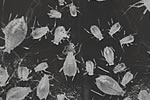Some Background
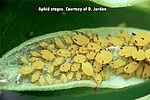
Aphids, members of the order Hemiptera, are probably the most notorious pests in the world. With well over 4000 species of aphids in this huge order, there is an aphid for everyone and nearly everyone in horticulture and agriculture may have to, at some point in time, deal with aphids. They are often one of the first pests to appear — usually very early in the season. Some of the reasons for this is due to their life-cycle but, perhaps, it is because they love tender new growth. Aphids are called plant lice by some people, though based on our experiences, this is not typical.
How They Become a Problem
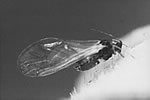 Trouble often starts in greenhouses when the operator cranks up the heat a little as the plant material he or she has sown begins to germinate and leaf out. Normally aphids don’t attack the cotyledons, but are keen on any new growth beyond that point. They usually stay on the newest growth and follow it upward as the plant develops — all the way through the budding and flowering stages.
Trouble often starts in greenhouses when the operator cranks up the heat a little as the plant material he or she has sown begins to germinate and leaf out. Normally aphids don’t attack the cotyledons, but are keen on any new growth beyond that point. They usually stay on the newest growth and follow it upward as the plant develops — all the way through the budding and flowering stages.
 The infestation process begins as winged adult aphids come in from their winter hideaways (usually the craggy bark of nearby trees) during early spring when weather is warm enough to allow their flight and migration, and this can be very early in the season. Exception to this rule, of course, will include human introductions where aphids are brought into a structure hitchhiking on purchased plants. Remember: scout new plant material thoroughly before bringing it into your greenhouse.
The infestation process begins as winged adult aphids come in from their winter hideaways (usually the craggy bark of nearby trees) during early spring when weather is warm enough to allow their flight and migration, and this can be very early in the season. Exception to this rule, of course, will include human introductions where aphids are brought into a structure hitchhiking on purchased plants. Remember: scout new plant material thoroughly before bringing it into your greenhouse.
Exponential Growth
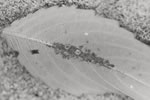 The winged adults light on plants ready to give birth, which, mostly in greenhouses is done viviparously — in other words, they bear wingless living young, skipping the egg-laying stage entirely. This gives aphids a unique time-saving advantage. To further compound the speed in which aphids can multiply, the nymphal or immature stages are entirely female and then reproduce further parthenogenetically, which means they have no need to mate. Adding insult to the grower’s injury, the nymphal stages are born with the next brood within them already, a condition called paedogenesis. To aphids the combination of these abilities spell exponential growth potential — to growers it means trouble if counteraction to naturally get rid of aphids is not taken immediately.
The winged adults light on plants ready to give birth, which, mostly in greenhouses is done viviparously — in other words, they bear wingless living young, skipping the egg-laying stage entirely. This gives aphids a unique time-saving advantage. To further compound the speed in which aphids can multiply, the nymphal or immature stages are entirely female and then reproduce further parthenogenetically, which means they have no need to mate. Adding insult to the grower’s injury, the nymphal stages are born with the next brood within them already, a condition called paedogenesis. To aphids the combination of these abilities spell exponential growth potential — to growers it means trouble if counteraction to naturally get rid of aphids is not taken immediately.A Serious Pest
 An additional problem that may also affect the aesthetics of the plant include presence of cast skins — a by-product of aphids molting from one nymphal stage to the next (which is occasionally confused by novices as stationary whiteflies since they’re white). Another aesthetics problem, if the population becomes large enough, is the formation of black-sooty mold growing on the sugary, ant-attracting excrement of these pests. This excrement (a.k.a. poop) is known to attract sugar-feeding ants which may, in an effort to manage their food source, herd or physically move aphids and protect them from biocontrols, natural and introduced. This last condition, if the aphid population grows large enough to support ants, can make orgainc aphid control even more challenging.
An additional problem that may also affect the aesthetics of the plant include presence of cast skins — a by-product of aphids molting from one nymphal stage to the next (which is occasionally confused by novices as stationary whiteflies since they’re white). Another aesthetics problem, if the population becomes large enough, is the formation of black-sooty mold growing on the sugary, ant-attracting excrement of these pests. This excrement (a.k.a. poop) is known to attract sugar-feeding ants which may, in an effort to manage their food source, herd or physically move aphids and protect them from biocontrols, natural and introduced. This last condition, if the aphid population grows large enough to support ants, can make orgainc aphid control even more challenging.
Winged aphids start the ball rolling. From that point on the aphids no longer have wings and those forms will not be present. If you detect some winged aphids, your population is probably in its beginning stages, however like everything else in the complicated world of pests, there are exceptions. In this case the exception is if your aphid population is in full swing, a brood of winged aphids will be developed. The reason for this is simple: the host plant is becoming overloaded and may not be able to support further aphid population growth. The colony wants to spread. In other words, if you detect plants loaded with aphids and some are winged forms, the problem is quickly going to affect nearby plants. There is no greater time to take advantage of the aphid control options available.
Some Advice
 If it’s not yet apparent in this page, let’s spell it out: aphids can be a disastrous pest to have in your crop. The damage they can cause can be severe to the point of total crop loss. Your scouting must be thorough and regular — especially early in the season. Aphids aren’t usually difficult to spot, though they do go undetected by too many growers. Unfortunately growers notice the ants or cast skins before they actually see the pests themselves. This is unnecessary, though, as the first aphids should be easily noted with proper scouting.
If it’s not yet apparent in this page, let’s spell it out: aphids can be a disastrous pest to have in your crop. The damage they can cause can be severe to the point of total crop loss. Your scouting must be thorough and regular — especially early in the season. Aphids aren’t usually difficult to spot, though they do go undetected by too many growers. Unfortunately growers notice the ants or cast skins before they actually see the pests themselves. This is unnecessary, though, as the first aphids should be easily noted with proper scouting.For the Scout
 Aphids, at least the winged forms, may be inadvertently captured on sticky traps, but physical plant inspections are much more valuable to the scout. Many aphids are green in color which can make detection more difficult, but several species are not well camouflaged and can be quite colorful. Since aphids tend to congregate on the growing tips and flower buds, they can be easier to spot, the scout should know where to look and not be stuck searching for tiny individuals. The color of these three to six mm pests can range from yellow to red, green and blue to gray, and even black to white and fuzzy-looking. Most species have two horn-like structures, called cornicles, on the posterior end of their abdomens flanking a small caudal tail (they have a total of three things on their butt). Their antennae are rather long and are swept back toward their rear along the sides of their body. In combination, these features can aid in their identification.
Aphids, at least the winged forms, may be inadvertently captured on sticky traps, but physical plant inspections are much more valuable to the scout. Many aphids are green in color which can make detection more difficult, but several species are not well camouflaged and can be quite colorful. Since aphids tend to congregate on the growing tips and flower buds, they can be easier to spot, the scout should know where to look and not be stuck searching for tiny individuals. The color of these three to six mm pests can range from yellow to red, green and blue to gray, and even black to white and fuzzy-looking. Most species have two horn-like structures, called cornicles, on the posterior end of their abdomens flanking a small caudal tail (they have a total of three things on their butt). Their antennae are rather long and are swept back toward their rear along the sides of their body. In combination, these features can aid in their identification.Some Solutions
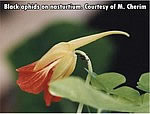 There are many biological pest control agents available to specifically address naturally getting rid of aphid pests. Some, like the Aphidius spp.,
There are many biological pest control agents available to specifically address naturally getting rid of aphid pests. Some, like the Aphidius spp.,
can be used preventively — which is highly recommended, especially when considering the awesome destructive potential of these pests. Chemical controls can also be effective, but great care must be taken as aphids can easily develop resistance to many pesticides.
In our opinion, if scouting is done right and if biocontrols are used preventively, aphids can be a non-issue issue for growers. Aphid control can be easily achieved, but only if aphids are understood and respected.

